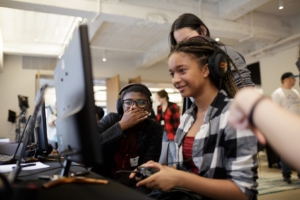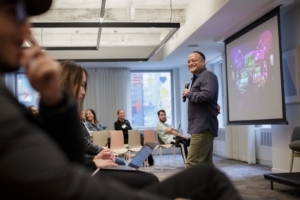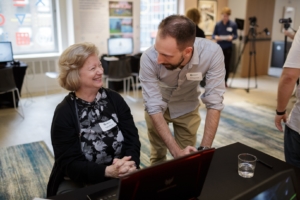
On a cloudy morning in New York City last Thursday, a class of students from a local technology magnet school joined video game industry professionals, Games for Change staff, and experts from Ubisoft to experience some of the newest and most innovative educational games available. The event, dubbed “Keys to Learn”, was put on through a collaborative effort between the nonprofit Games for Change and video game company Ubisoft.

Computers set up around the space featured interactive demos of Discovery Tour: Ancient Greece and Project Oikos, a co-op game announced at the UN Climate Change Summit as part of the industry’s Playing for the Planet initiative. In addition, attendees were invited to try Ubisoft’s newest release, Rabbids Coding—a free game developed to teach children coding without instruction or supervision.
Through playing the various games, students were able to explore new worlds and ideas. From exploring ancient Greece to learning the fundamentals of coding, each game offers players the chance to view and act within a new world. For the students and adults who were able to play, the hands-on experiences brought the educational benefits of games into clear focus.
In addition to offering demos, the day featured a variety of speakers who offered unique insight into the reasons games are such an effective educational tool. The program was kicked off by remarks from Susanna Pollack, President of Games for Change, which brought the focus to the power games have to impact the world positively. Asi Burak, Chairman of Games for Change, echoed this sentiment, highlighting games like Clouds Over Sidra (which allows players to virtually experience the Za’atari Refugee Camp in Jordan) and the Peacemaker game (which allows players to act as a government in the Israeli-Palestinian conflict) as case in proof of the powerful impact games can have.

The ensuing panels featured field experts, industry heads, and prominent academics, and more, all exploring together the many different reasons games can be such effective learning tools.
“When you play games, you can try and fail in a safe way. It’s a way to fail and learn from your failure, which teaches kids resilience,” Stephanie Magnier, VP of Global Communications at Ubisoft, said.
The afternoon closed out with a highly informative keynote from Jan L. Plass, Ph.D. at the Paulette Goddard Chair in Digital Media and Learning Sciences, and Professor in the Steinhardt School of Culture, Education, and Human Development at New York University.



